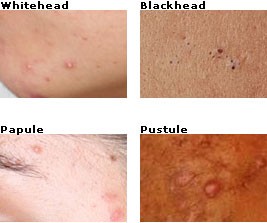What is Acne?
Product Information

Acne Scar Treatments
What is Acne (Medically known as Acne Vulgaris)?
Acne is a skin condition (lesion) that can appear as pimples/blackheads/whiteheads or as complex as red, blocked pores (cysts). In the worst case situation, they can leave scars around the affected area and can be quite painful. While a majority of acne occurs on the face (especially forehead, nose and chin – known as the T-Zone), it can also appear on the back (the second commonly affected area), neck, upper arms, chest, and shoulders. Acne also affects people of all ages, gender and race, even babies. But a majority (85%) are people in their teens (12-17).
What is Acne – The Teenage Years
Why teenagers?
This is the puberty years where the body undergoes changes in the road to adulthood. It is this period where the body starts to over produce an oily substance called sebum. Subum is what keeps your skin and hair soft and lubricated. The over production of subum will make the skin feel more “oily” and pores to be clogged. Everybody’s body will produce different levels of sebum thus leading to different level of skin lesions. This principle is very important to keep in mind when selecting the right acne treatment.
What is Acne – Whiteheads and Blackheads
During the puberty period, there is also an over production of follicle cells. When these cells die, they mix in with the overabundance sebum which leads to whiteheads and blackheads (oxidation of the oil). This mixture forms a breeding ground for bacteria leading to pimples that can reddened and swell.
What is Acne – Emotional and Psychological Impacts
While having acne (even severe ones) is not life threatening, it can leave emotional and psychological impacts especially for teenagers. A facial pimply appearance will affect self-image, self-esteem and self-confidence. This can lead to depression and withdrawal from friends.
What is Acne – The Treatments
Your mother will have told you to always wash your face often. This is partly true. It will help to keep the skin oil free and clean. But will it treat and get rid of acne? No. Keeping the skin oil-free and clean is a “topical” solution, that is, it treats the skin above the surface of the skin and not what’s below the skin, which is the root cause of acne.
There are basically two types of acne treatments
- Medication and creme that you apply on the skin.
- Medication and anitbiotics that you take orally to fight acne from within the body. This includes a change in lifestyle and diet.
Usually, mild cases of acne can be cleared up through the use of otc (over the counter) treatments. By age 25 the acne should go away.
What is Acne – Our Recommendation
The acne products that we recommend all have at least the 2 above types of treatment. This is what makes them all effective in treating acne. Avoid those products that just treats acne at the surface of the skin. You will also come across two chemicals that some products use – Benzoyl Peroxide (helps to keep the skin dry) and Salicylic Acid. Benzoyl (cleans up the pores). Benzoyl Peroxide and Salicylic may cause irritation for people with sensitive skins. Some products are now using non-chemicals.
Now that you know the “What is Acne” basics, it will help you in selecting the right acne product for your particular acne situation.
As always consult with a dermatologist first.
